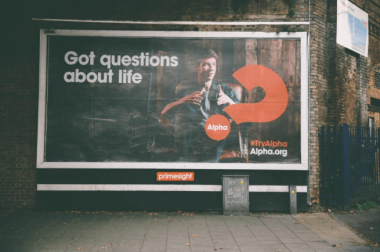Christianity Explored, or #tryalpha? Time to make the Ultimate Choice
You stand at a crossroads in your life. All your questions and searching have led to this moment. The decision you make will shape your future for eternity. So what choice will you make?

Alpha, or Christianity Explored?
If that introduction made no sense to you, then you might not be part of the evangelical Christian subculture. But the door is always open (for now), so come on in.
In the last decade or so, Christian groups like Alpha and Christianity Explored have changed the way Christians do outreach. Street preaching, Bibles in hotel rooms, and large evangelical rallies have largely made way for something more intimate, friendly, and laid back. In both Alpha and Christianity Explored, the focus is put on asking questions and trying to make sense of life; having meals and conversations which facilitate those questions while introducing people to Jesus.
As September ushers us into a new season of life at school, university or work, perhaps you would like to consider running or attending one of these courses. But which should you pick? As fun as it would be, this article will not feature a Harry Hill inspired "FIGHT!" where we decide which course reigns as king. Both courses have the same ultimate aim, just with different approaches, so lets see how they compare.
Alpha was pioneered by Nicky Gumbel in 1990, as a short course at his church Holy Trinity Brompton (HTB) in London. Today over 29 million people have tried the course across 169 countries, in all mainline protestant denominations, and in Catholic and Orthodox churches too. This owes much to the flexibility of the course, its essentials being simply "food, a talk, and a good conversation."
The course runs over about 11 weeks, each week containing a different talk on basic questions like 'Is there more to life than this?', 'who is Jesus?', and 'how does God guide us?'. Talks like 'why and how do I pray' and often a weekend which focuses on the Holy Spirit highlight Alpha's experiential edge. As Harriet—who has run and taught Alpha courses with HTB—tells me: "The whole course is one that gives one the opportunity to truly encounter God."
If Alpha has a mascot, it is almost certainly Bear Grylls, the death-defying adventurer who greets you in their latest promotional material. There he intentionally avoids any theological baggage, simply speaking about "light to a dark path", concluding with: "simple faith that empowers my life...to me thats been my greatest adventure."
Alpha's global exposure means those outside of the church are more likely to have heard of it. Steve, who has run both Alpha and Christianity Explored on his local estate, agreed that Alpha's name recognition can be a helpful draw. Indeed, you may well find it an easier pitch to a friend if you can say "well Bear Grylls likes it, so come along!" Its ubiquity also is a reminder that it's a relatively tried and tested product, and its flexibility should encourage you that as a leader you don't need to have all the answers, just be willing to have a conversation. For a post-Christian western culture, Alpha looks to cultivate a good space for deconstructing people's fears and grievances with formal 'religion', and invites people instead to experience the power of God.

For others though, Christianity Explored (CE) will be their choice course. CE, founded by Rico Tice, also emphasises a space for people to bring their questions about God and life, with a more specific focus on Jesus. Rico introduces CE on his website: "The offer Jesus made...makes sense of life in a way nothing and no one can." CE runs through the 16 chapters of Mark's Gospel, with videos accompanying, and focuses on three questions: 'Who is Jesus?', 'Why did Jesus come?', and 'What does it mean for us?'
Sally, who uses CE at her church, appreciates the fact that "it is rooted in the Bible, always pointing back to Mark's gospel so that people are really clearly seeing who Jesus is according to God's word...[and the study guides] don't take it for granted that people will be familiar with Bible words/stories so there are some helpful explanations there too." Chris in Nashville has run one of CE's video resources, 'SOUL' on various occasions, and found that "it is just as good for unbelievers as it is for the more mature Christian students. It talks about everything with "fresh eyes", so as to allow Christians and non-Christians to gain a lot from it... for many of my students, it was the first time that Gospel actually "clicked" in their mind."
Stu, who works with International students in Scotland, rates the 'Universal Edition' of CE, which is aimed at international students or those of a lower literacy level. "We enjoyed running it and felt it gave people a very good foundation...for that audience, its clarity is excellent," he said. By contrast Stu says the open question format of Alpha can make it tough for those without any western Christian background to get their heads around: "[For them] its really hard to piece it all together."
CE is more conservative, theologically speaking. Its approach is somewhat starker: emphasising the dangers of Hell, and the need for sinners to respond to God's forgiveness. Furthermore, Alpha devotes a weekend away to the Holy Spirit; comparatively one source felt that CE "doesn't really talk about the Holy Spirit at all...it feels lacking." Avoiding debates about the role of Holy Spirit for now, it's worth being aware of these different approaches. Depending on where you come from, or where your audience is at, one approach may be preferable to the other.
Steve ran both courses on his London Estate, where he found CE followed Alpha well as a 'follow up', providing a "different angle": some more in-depth discipleship and Bible study that's still geared toward the unchurched. He also found the more experience-focused Alpha—for example singing and learning to pray together—to be a profound experience. "People want to be prayed for at difficult times," he said. Such an approach can show people what church looks like without the cultural stigma of attending a Sunday service: "Sharing troubles and sharing life together. That is Church...it feels normal'.
As fun as binary-toting articles about choosing 'x' or 'y' can be, we have of course covered only two of the biggest approaches that exist for Christians who want to share their faith. Others certainly exist, but all structures and resources aside—nothing can come close to the simple power of present, compassionate friendship.
When Jesus met with people, he joined them for meals, and listened to people's questions. He didn't always have clear answers for people, but he did offer himself. In a world full of distractions, let's be present. And in a culture where everbody's trying to sell something, let's not do the same.
Do a Christianity Explored course, or #tryalpha, but don't forget to offer yourself.











